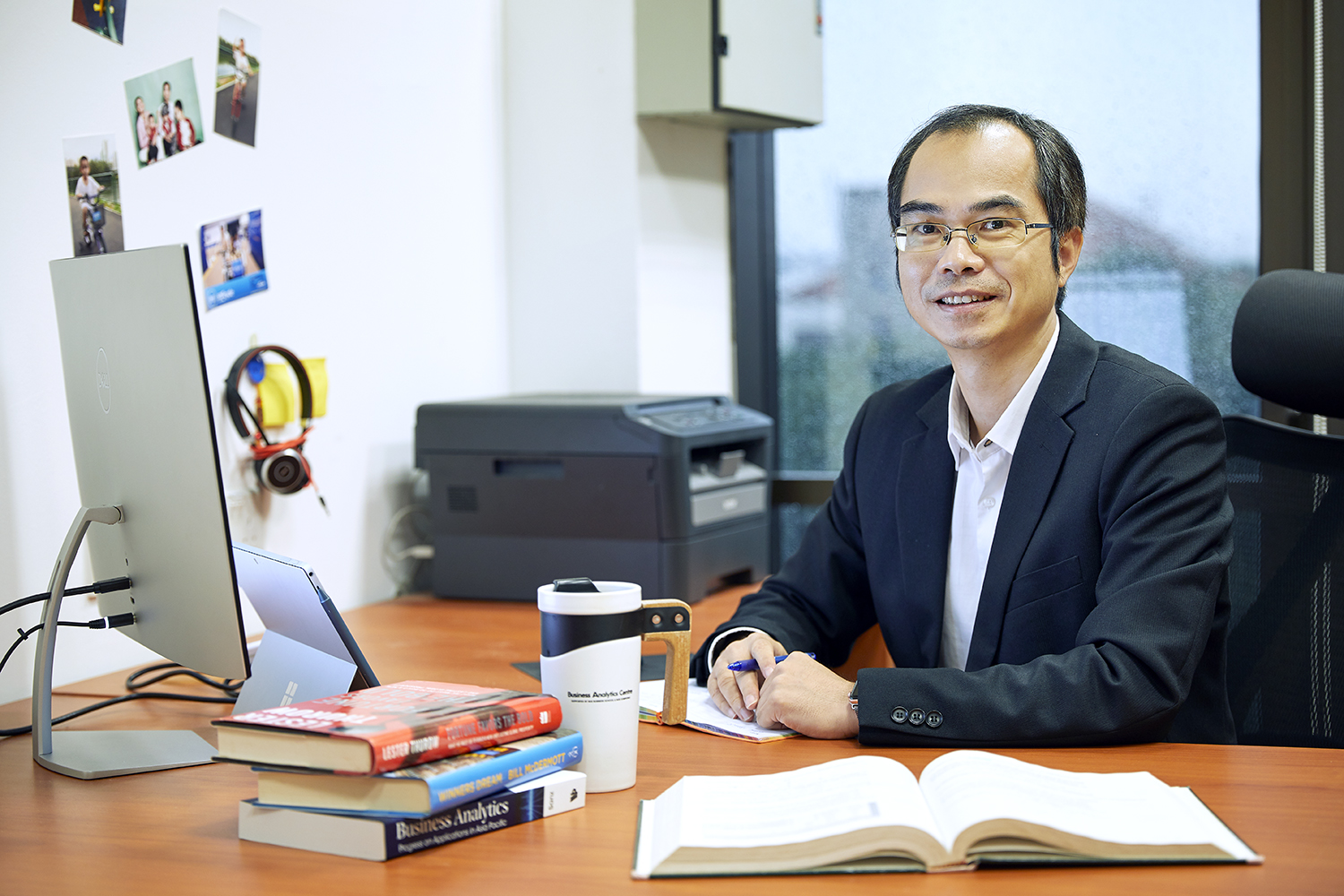In 2013, the National University of Singapore (NUS) Business Analytics Centre (BAC) was set up by NUS and IBM, with the support of Singapore Economic Development Board. In the same year, the Master of Science in Business Analytics (MSBA) programme was launched and was the first in Singapore to offer in-depth business strategy thinking and data analytics.
 Associate Professor James Pang speaking with MSBA students
Associate Professor James Pang speaking with MSBA students
Associate Professor James Pang, Academic Director of the MSBA programme, was among the initial group that established the BAC, before he eventually joined NUS as a full-time faculty member in 2017.
“I was the Analytics and Optimisation Chief Architect at IBM Asia Pacific at the time,” A/Prof Pang shared.
“Working with students was a new experience for me. I enjoyed the experience of interacting with the MSBA students and saw that they appreciated the experience and knowledge that I brought as a professional with industry experience.”
“BAC was founded with the purpose to cultivate talents in AI, machine learning and business analysis for the industry. We knew that for this hub to be successful, we needed to have extremely close collaborative ties with the industry,” he noted, adding that this has carried over to the MSBA programme.
“The MSBA programme has two inherent and distinct advantages; NUS’ close connections with industry organisations, and the combined academic prowess of the NUS School of Business and the School of Computing, both of which have contributed to the programme’s curriculum.”
A/Prof Pang pointed out that NUS has ties with numerous established and internationally renowned companies, such as Oracle, Accenture and Morgan Stanley to name a few.
“We have built this up through extended and deep working relationships with industry. For example, we started working with DBS during our beginnings in 2013. We are working together to this day, with NUS still sending students to DBS’ data analytics department for internships.”
Apart from its close ties to industry, the MSBA also features a strong synergy within NUS, between the School of Business and the School of Computing. In fact, the MSBA programme has been one of the most successful interdisciplinary collaborations in NUS. Students in the programme have obviously benefitted from this, having been equipped with the hard and soft skills needed to succeed.
“In the real world, you need hard technical and business skills to develop good solutions, but you also need excellent soft skills to present your ideas convincingly,” A/Prof Pang emphasised on the point.
 Associate Professor James Pang
Associate Professor James Pang
MSBA students have racked up a string of notable achievements in competitions on both the local and international stage, being regular participants in the CIKM AnalytiCup, Microsoft Azure Virtual Hackathon, and NUS FinTech Society Hackathon. In 2020, the NUS MSBA team beat out other participants from Tsinghua University, the University of Hong Kong and the University of California, Berkeley, to top the Chengdu 80 FinTech Competition.
“Our own Business Analytics Innovation Challenge is also an important part of the MSBA programme,” said A/Prof Pang. “The competition showcases the knowledge and skills students have learnt in this course.”
“We select an industry partner to organise the competition with each year and tie the competition’s topic to actual pain points that exist within the industry,” he elaborated. “Students are grouped in teams of four to six, given up to three months to work on this project, and are provided actual data sets from the company to base their project on. During this period, students also receive guidance and feedback from industry partners on their projects.”
 The winning team of the Business Analytics Challenge 2017
The winning team of the Business Analytics Challenge 2017
Business Analytics Innovation Challenge
Since its beginning in 2015, the competition has provided students with an opportunity to use the skills they have learnt to tackle an existing workplace issue with MSBA industry partners.
Past industry partners include the Energy Market Company, Johnson & Johnson as well as Singapore government statutory boards.
“We are also very proud of the capstone project component of our programme,” A/Prof Pang added. The Business Analytics Capstone Module (DBA5102), which runs over a period of 13 months, consists of three parts: capstone classes, industry analytics seminars, and a full-time capstone project.
“Through all these activities in the programme, we hope to cultivate three traits in our students: the ability to frame business needs into either mathematical, artificial intelligence (AI) or simulation models; the technical know-how to manage data—gathering data from various databases, processing and analysing data, as well as establishing practical solutions; and a familiarity with the industry.”
A commitment to continuous learning is an absolute necessity to succeed in this field, A/Prof Pang believes. He has observed that leaders in the industry do not rest on their laurels and are always learning about the latest topics them come across, such as AI or data analytics.
“In this industry, there are many areas that are ever in motion and evolving,” mused A/Prof Pang. “Thus, an important factor in achieving success is the ability to nail down the important parts of new topics and subjects. Once someone has developed that skill, the playing field becomes a lot wider as one can start analysing and applying his or her skills to any problems that arise.”
To read more about the Master of Science in Business Analytics programme, click here.